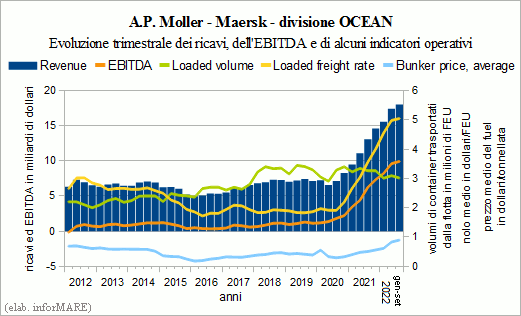
From the first trimester last year the shipowning group Danish A.P. Møller-Mærsk continues to raise, quarter after quarter, the value of the historical record of its quarterly revenues and so it happened also in the third quarter of this year, period ended with a turnover never reached before and equal to 22.77 billion dollars, with a strong increase of +37.1% on the third trimester of 2021. The Succession of new records is generated from the record values of the turnover of the containerized maritime transport segment, which constitutes the primary activity of the Group, a sector that in the third trimester of 2022, with 18,02 billion dollars (+37.6%) of of which 16.01 billion produced directly from maritime shipments (+38.3%), again recorded an all-time peak in revenues.
In the July-September quarter of this year the group totaled an EBITDA of 10,86 billion dollars (+56.4%) and a Operating profit of 9.48 billion (+61.8%), both record values which benefited from record injections of €9.92 billion (+58.8%) and 8.73 billion (+63.6%) from the shipping segment containerized. The Maersk Group closed the third quarter of 2022 with a profit clearly record of 8,91 billion dollars (+63.2%).
In the third quarter of this year, however, cargo volumes containerized transported by the group's fleet have decreased, as has been the case since the third quarter of last year, having been equal to 3.02 million 40-foot containers (FEU), down by -7.6% on the July-September period of 2021. The Average freight per container transported was 5,046 dollars/feu (+41.7%). The costs per container transported are increased by +15.8% being piled to 2.474 dollars/feu. If the Average fuel cost was up by +77.6% having been of 895 dollars/ton, the consumption of bunkers is diminished of -4,8% having totaled 2,68 million tons of fuel used by the fleet.
With regard to the ongoing trend of growth in the value of sea freight, although reduced compared to previous months, the CEO of the Danish group, Søren Skou, has stated that "it is clear that freight rates have reached the peak and during the quarter began to normalize to followed by both declining demand and easing supply chain congestion. As anticipated by beginning of the year - Skou specified - in the coming months the revenues of the Ocean division will decrease." "With the war in Ukraine, the energy crisis in Europe, high inflation and A looming global recession - he added - there are many Dark clouds on the horizon. This weighs on purchasing power of consumers and this in turn has an impact on demand global transport and logistics'.
